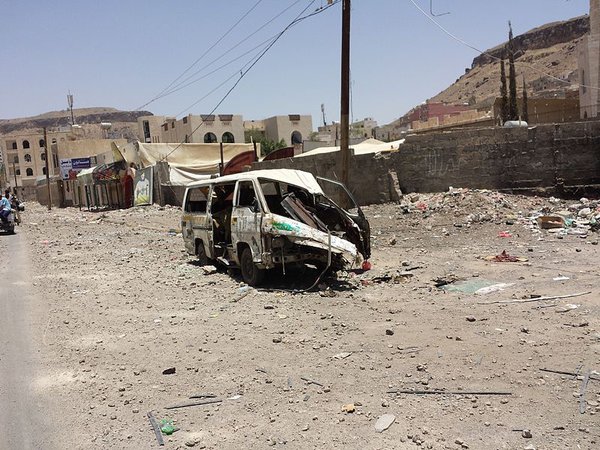Iran Falsely Blamed for Yemeni Houthis’ Retaliation Against Saudi Aggression
By Stephen Lendman

Establishment media march in lockstep, featuring state-approved propaganda over truth-telling on major issues.
Despite no evidence suggesting Iranian involvement in striking Saudi oil facilities on Saturday, likely causing significant damage, establishment media headlines read like Trump regime/Pentagon press releases:
NYT: "Saudi Oil Attack Photos Implicate Iran, US Says; Trump Hints at Military Action"
The Times falsely claimed "strikes came from the direction of Iraq or Iran." No credible evidence suggests it.
Washington Post: "Diplomacy now or later? Politicians debate how to handle Iranian aggression (sic)"
Wall Street Journal: "US Blames Iran for Attack on Saudi Oil Facilities"
WSJ: "An attack on Saudi oil production shows John Bolton was right (sic)"
Fox News: "Attack on Saudi oil facility shows Trump was right to pull out of Iran nuke deal (sic)"
Fox News: "After Saudi Arabia is attacked, will US military attack Iran?"
MSNBC: "US blames Iran for attack on Saudi oil refineries"
CNN: "Trump: US 'locked and loaded depending on verification' of attack on Saudi oil field"
ABC News: "Iran fired cruise missiles in attack on Saudi oil facility: Senior US official (sic)," adding:
"Iran launched nearly a dozen cruise missiles and over 20 drones from its territory in the attack on a key Saudi oil facility Saturday (sic), (an unnamed) senior Trump administration official told ABC News Sunday."
The broadcaster and other establishment media failed to explain that no credible evidence backs phony accusations made.
CBS News: "US blames Iran for drone strikes on Saudi oil plants"
NBC News: "US-Iran tensions escalate after attack on Saudi oil sites"
Chicago Tribune: "Trump: US locked and loaded for response to attack on Saudis"
LA Times: "Oil jumps the most ever after attack cuts Saudi Arabian supplies"
National Pentagon Radio (NPR): "Secretary of State Mike Pompeo has directly accused Tehran of playing a key role in the strikes" on Saudi oil facilities" - despite no evidence suggesting it not stressed.
USA Today: "Saudi attack, possible US response"
AP News: "Energy prices spike after Saudi oil attack, US blaming Iran"
Reuters: "White House defends blaming Iran for Houthi oil attack"
Reuters: "Iran hardliners likely to gain from tensions over Aramco attacks (sic)"
UK owned and controlled BBC: "Saudi oil attacks: US says intelligence shows Iran involved (sic)"
London Guardian: "Saudi Arabia oil attack: Trump hints at action as US points finger at Iran"
Al Jazeera: "Mike Pompeo blames Iran for Aramco drone attacks"
German public broadcaster DW: "US blames Iran for Saudi oil attack despite Iranian denials"
Iran debunked false US accusations. No evidence suggests its involvement in Saturday attacks on Saudi oil facilities.
Its Foreign Ministry spokesman Abbas Mousavi said "(t)o pin such action on Iran is in line with the (US) maximum deceit approach that they have adopted following their failures," adding:
"Yemen has been entangled in war for five years, and Iran has naturally clearly announced that it supports the Yemeni people and their rights, but blaming Iran for (actions by Houthis) is in line with (the US policy of) maximum lie(s). Such remarks are essentially baseless and untrue."
China's Foreign Ministry called false US accusations against Iran "irresponsible," adding: "China's position is that we oppose any moves that expand or intensify conflict."
Russia's Foreign Ministry sent mixed messages. It "resolutely condemn(ed)" Saturday's attack that disrupted world energy markets with potentially negative consequences for the global economy.
While noting that striking Saudi oil facilities is a "direct consequence of the continuing crisis in Yemen," the Ministry failed to explain that Yemeni Houthis responded to Saudi aggression in self-defense, their legal right under the UN Charter and other international law.
They want peace and stability restored to the war-torn country. The most strategically effective way is by making the Saudis pay dearly for their unlawful actions - in cahoots with the US.
At the same time, Russia "strongly recommend(ed)" against rushing to rash conclusions and considering "military options," it called "unacceptable."
The Kremlin wants Middle East wars resolved diplomatically, clearly against the region boiling over by attacking Iran.
On Monday, Houthi spokesman Yahya Saree said another attack on Saudi facilities may be launched at any time.
He urged foreign companies and personnel working at Saudi energy and other facilities to immediately leave to avoid being in harm's way.
He claimed Houthi forces can strike strategic Saudi targets whenever they wish, adding:
"Riyadh must reconsider its calculations and stop its attacks and blockade against Yemen," indicating further strikes will occur otherwise.
Photo: By Ibrahem Qasim - Own work, CC BY-SA 4.0, https://commons.wikimedia.org/w/index.php?curid=39857308
Subscribe to Pravda.Ru Telegram channel, Facebook, RSS!


